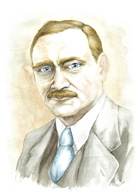Biographers choose what to include

Drawing of John Grierson by Magali Lefrançois, from the cover of Evans's biography of the founder of the National Film Board.
Want to know a secret about National Film Board founder John Grierson?
It’s a startling confession that Grierson made 35 years ago to Concordia Communications professor Gary Evans, who was then a graduate student writing his thesis about the great documentary pioneer. Grierson forbade him to reveal his secret.
Evans, who went on to publish Grierson biographies and a history of the NFB, told an audience at the recent Blue Metropolis Literary Festival that “it was quite important as a moment of truth, and I’ve never been able to put it into print.”
The Blue Met workshop was called The Public and the Private I: The Limits to What Writers Can Say About Other People, and it was sold out to the room’s capacity of 50 people. There were four panelists, all writers.
“What you include and what you excise is up to you,” Evans said. “Our goal should be do no harm.”
He left out Grierson’s copious drinking in his first biography, but did include it in his recent one. He dismissed a current trend to sex-and-violence bios as “gonzo histories” and “tabloid journalism.”
Muriel Gold, a guest lecturer at Concordia’s Drama Therapy program, was also on the panel. She said it was a greater challenge to produce a good yarn that does not rely on lurid details. “It’s more difficult to write something interesting without taking cheap shots.”
Gold recently published a portrait of her parents. Now she is working on a history of the Saidye Bronfman Centre Theatre, where she was artistic director for eight years.
Psychoanalyst Mary Kay O’Neil said her book, The Unsung Psychoanalyst: The Quiet Influence of Ruth Easser, included only those private details she felt shed a light on Easser’s professional significance. “I didn’t ask about whether she had lovers.”
Susan Gabori, on the other hand, said she “seduces” murderers into spilling their guts in interviews and then reports what they say as they say it. “And they tell me some pretty horrific things,” she said.
“I presume that what people reveal is what they want to. I think there’s a little suitcase in all of us that we want to open, and the key is a question.”
People can forget they’re being taped, Gold said. “If I think something said in an interview is off-colour, I ask if they want it off record. I feel responsible for the people I’m interviewing and the people they’re talking about.”
Grierson’s secret was that he claimed to have been an agent of the MI-6 British intelligence unit during the Second World War. Evans considered this a hugely important detail, since Grierson’s career at the NFB ended when he was accused of being a Soviet spy. But Grierson said that he would deny it if Evans went public.
Evans told the Blue Metropolis crowd of about 50 that he had done some checking into Grierson’s claim.
“He was not a paid member of MI-6, but it doesn’t mean that he wasn’t tied in with MI-6. It remains a mystery, and you’re the first people I’m sharing it with in 35 years.”
Evans’s John Grierson: Trailblazer of Documentary Film will be launched at Paragraph Bookstore on May 17, at 6:30.
Concordia couple lecture in China
Part-time faculty members Gary Evans and Karen Doerr are in China to lecture at Hainan University (Haikou City), the China University of Communications (Beijing) and Beijing University.
Evans teaches at Concordia in Communication Studies, and Doerr teaches in Classics, Modern Languages and Linguistics and at the Simone de Beauvoir Institute.
Doerr explained in an e-mail, “This academic connection is a felicitous result of the visit of the Chinese scholars' delegation to Concordia in July 2004. It is a great honour to represent Canada and Concordia, and we are very excited.
“Gary will be organizing Canadian Cinema Week at Hainan and the Beijing universities, where he will present a series of Canadian films, followed by lectures and seminars.
“I will be lecturing on Canadian women writers and on women's studies in Canada with a special emphasis on the cutting edge work being done here at Concordia.
“We see our lecture tour as an extension of the academic Canada-China connection.”
The Department of Foreign Affairs will cover transportation costs, and the Chinese universities will take care of the couple’s food and lodging.